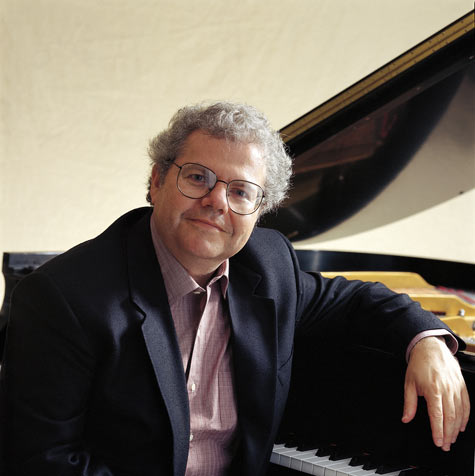
BICENTENNIAL BOYS You couldn't quibble over Emanuel Ax's choice of works by Chopin and Schumann.
|
I don't want to imply that everybody who's anybody was at Jordan Hall Friday night to hear pianist Emanuel Ax's Celebrity Series recital — but that was Yo-Yo Ma sitting two rows in front of me. Ma had played Haydn's Cello Concerto in C with Ton Koopman and the BSO that afternoon, and there were rumors that he might join his frequent duo and trio partner on the Jordan Hall stage, as he did at the Mahaiwe Performing Arts Center in Great Barrington a week ago Saturday, when they played the Chopin Cello Sonata.
Not that the announced program — which celebrated the twin bicentennials of Chopin and Schumann — wasn't sufficient incentive to show up. From Chopin, we were offered the Polonaise-fantaisie and Andante spianato & Grande polonaise along with a half-dozen mazurkas. From Schumann, the great Fantasie in C and the whimsical Fantasiestücke.
Ax himself is not a performer I've ever had much luck appreciating. Born in Lviv (in what is now Ukraine) in 1949, he draws his Polish-Jewish spiritual heritage from Artur Rubinstein rather than Stefan Askenase; he has a big tone and a big dynamic range and also a delicate sensibility, but when it comes to architecture, you get pediments and cornices instead of the big picture. His phrases are predictable: he'll drive through the first half, often bypassing harmonic nuances, and then loosen up in a beautiful but studied fashion.
No one could complain about the unpretentious way he sat down and dove right into the Polonaise-fantaisie, or about the barcarolle-like rocking he created at the beginning of the B-major middle section. But too much of it slid by — "Grand but not thoughtful" is what I wrote in my notebook. That was doubly true of the mazurkas (Opus 24 No. 2 and Opus 56 No. 3) that came next; they sounded like salon pieces. (The Czech pianist Ivan Moravec would be my benchmark here.) The Fantasie started with a big arc, the bass used nicely for shaping, but then the quieter Adagio and "Im Legendenton" sections — perhaps Clara's response to Robert — seemed quarrelsome. The second-movement march unfolded without affectation and only a little smudging in the devilish coda; the finale, which ought to be celestial, had constellations pushing and shoving. Ax did play the earlier version of the finale, in which the "An die ferne Geliebte" Beethoven reference that unlocks the first movement returns to crown the proceedings; I'd never heard it before in concert, and only, if memory serves, from Charles Rosen on record.
Matters improved in the second half. "Des Abends," which starts off the Fantasiestücke, lacked awe or any sense of discovery, and the closing "Ende vom Lied" was another forced march, but in between — especially in the soaring flight of "Aufschwung" and the plaintive inquisition of "Warum" — I sensed the ghosts of Schumann's beloved Jean Paul and E.T.A. Hoffmann flitting about. The four mazurkas from Chopin's Opus 41 were no more coherent than the earlier ones had been, but the Andante spianato & Grande polonaise — the second element presented without the usual orchestra — had me thinking that the polonaise is Ax's element: he was heroic, explosive, and technically formidable.
The crowd — a sold-out house, by the look of it — likewise erupted, and as Ax returned for a series of bows, eyes turned to Ma. But he stayed put, and we had to settle for a single encore (it was a full program), Chopin's A-minor waltz. Only then did Ma dash from his seat, and I nearly knocked the poor man over as I tried to put on my coat.